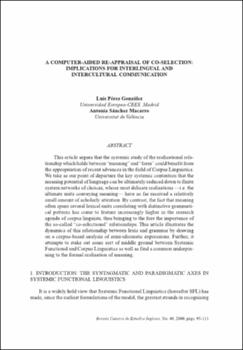A Computer-Aided Re- Appraisal of Co-selection: Implications for Interlingual and Intercultural Communication
Fecha
2000Resumen
This article argues that the systemic study of the realisational relationship
which holds between “meaning” and “form” could benefit from
the appropriation of recent advances in the field of Corpus Linguistics.
We take as our point of departure the key systemic contention that the
meaning potential of language can be ultimately reduced down to finite
system networks of choices, whose most delicate realisations —i.e. the
ultimate units conveying meaning— have so far received a relatively
small amount of scholarly attention. By contrast, the fact that meaning
often spans several lexical units correlating with distinctive grammatical
patterns has come to feature increasingly higher in the research
agenda of corpus linguists, thus bringing to the fore the importance of
the so-called “co-selectional” relationships. This article illustrates the
dynamics of this relationship between lexis and grammar by drawing
on a corpus-based analysis of semi-idiomatic expressions. Further, it
attempts to stake out some sort of middle ground between Systemic
Functional and Corpus Linguistics as well as find a common underpinning
to the formal realisation of meaning.





